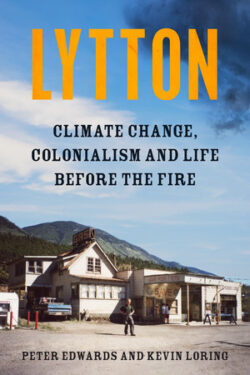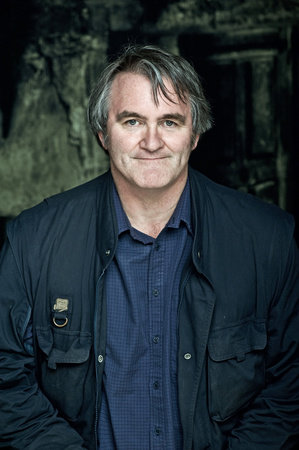Scorched memories
Lytton: Climate Change, Colonialism and Life Before the Fire
by Peter Edwards and Kevin Loring
Toronto: Random House Canada, 2024
$36 / 9781039006157
Reviewed by Amy Tucker
*

Lytton: Climate Change, Colonialism and Life Before the Fire by Peter Edwards and Kevin Loring provides an in-depth exploration of the history and environment of the small Canadian town of Lytton, BC. Blending historical research with creative storytelling, the authors investigate how climate change and colonialism have profoundly impacted the lives of Lytton’s residents. As a Kamloops resident who has seen the influx of Lytton evacuees firsthand, I find the book’s themes to resonate intensely, highlighting the broader regional impact and ongoing concerns of displaced residents.
The book is meticulously organized into sections addressing Lytton’s history and environmental challenges. It begins with an introduction to the town’s rich cultural heritage, deeply rooted in its Indigenous history and traditions. The authors explore the adverse effects of colonial practices on this heritage, detailing how these practices have shaped the town’s identity. Following this, they detail the environmental changes that have affected Lytton, culminating in analyzing the devastating fire that put the town into the national spotlight.

Edwards and Loring contend that to understand Lytton’s history, it is essential to consider the impacts of colonialism and climate change. They argue that colonial exploitation has significantly changed the local environment, making the community more vulnerable to natural disasters. The authors support their arguments with historical records, personal stories, scientific evidence, and Indigenous viewpoints. “Ever since the gold rush,” the authors write, “the Nlaka’pamux have been fighting for sovereignty over their lands, and against colonialism and erasure. When the environmentalists came into the community, they too began to talk as though they had authority over the land and could speak on behalf of its future.”
Including personal stories and interviews makes the analysis more relatable and engaging. These narratives add depth and emotional resonance, as exemplified by the statement, “Lytton had a long history of fires, but nothing like this. The picturesque little town in the mountains was suddenly a poster child for global climate disruptions.”
The influx of fire evacuees from Lytton to Kamloops has been overwhelming for our community, bringing logistical challenges and emotional stories that are hard to forget. I have met several evacuees, and their resilience is inspiring but also a stark reminder of our vulnerability. Their stories of loss and hope resonate deeply with the broader message of the book.
The authors critically examine how colonial practices have impacted the community and environment, providing insights into colonialism’s long-term effects. This urgent call to action should instill a sense of responsibility and motivation in the readers.
For residents in BC, the book offers critical insights into regional histories and shared environmental challenges, emphasizing the broader significance of Lytton’s story. The stories of loss and resilience highlight the urgency of the book’s themes, mirroring the anxieties of neighbouring communities about their vulnerability to similar events.

The stories of Lytton’s residents emphasize the importance of building resilient communities that can withstand and recover from environmental and social disruptions. The authors write, “There was no question of whether the community should rebuild.”
While the book thoroughly analyzes Lytton, it would be helpful to connect Lytton’s experiences to broader global trends. A more extensive comparison with other communities affected by similar issues could strengthen the narrative. Additionally, while the scientific analysis is substantial, it sometimes needs more depth for readers seeking more detailed environmental data. Further elaboration on the methodologies used could enhance the credibility of the scientific discussions.
The book suggests that future efforts should prioritize rebuilding Lytton with a strong focus on sustainability and resilience. This involves implementing policies that address the root causes of vulnerability, such as historical injustices and environmental degradation. Continued research and dialogue are needed on how communities can adapt to the changing climate while preserving their cultural heritage and social fabric.
Lytton: Climate Change, Colonialism, and Life Before the Fire is an informative book highlighting the importance of viewing historical and environmental issues through an interconnected lens. While there are areas where further elaboration could enhance the discussion, the book effectively illuminates the critical issues facing Lytton and similar communities. It is a compelling read for anyone interested in the ongoing dialogue about climate change, colonialism, and community resilience. I highly recommend the book to understand the significance of this event.
*

Amy Tucker is an instructor at Thompson Rivers University with a diverse educational background, including expertise in leadership, organizational behaviour, sustainability and ethics, and human resource management. In her spare time, she loves to read and enjoy adventures in her travel van, lovingly named “Vanish.” [Editor’s Note: Amy Tucker has reviewed books by Russ Grabb, Meaghan Marie Hackinen, Jayne Seagrave, Joanna Kafarowski and Martha Piper & Indira Samarasekera for The British Columbia Review.]
*
The British Columbia Review
Interim Editors, 2023-25: Trevor Marc Hughes (non-fiction), Brett Josef Grubisic (fiction)
Publisher: Richard Mackie
Formerly The Ormsby Review, The British Columbia Review is an on-line book review and journal service for BC writers and readers. The Advisory Board now consists of Jean Barman, Wade Davis, Robin Fisher, Barry Gough, Hugh Johnston, Kathy Mezei, Patricia Roy, Maria Tippett, and Graeme Wynn. Provincial Government Patron (since September 2018): Creative BC. Honorary Patron: Yosef Wosk. Scholarly Patron: SFU Graduate Liberal Studies. The British Columbia Review was founded in 2016 by Richard Mackie and Alan Twigg.
“Only connect.” – E.M. Forster
2 comments on “Scorched memories”
Dear Amy Tucker,
My name is Juliet Forrester and I am the literary agent representing Peter Edwards and Kevin Loring for the LYTTON book.
Thank you so much for your thoughtful review. I know Peter and Kevin will appreciate this very much.
Best wishes for a wonderful day!
Very best,
Juliet